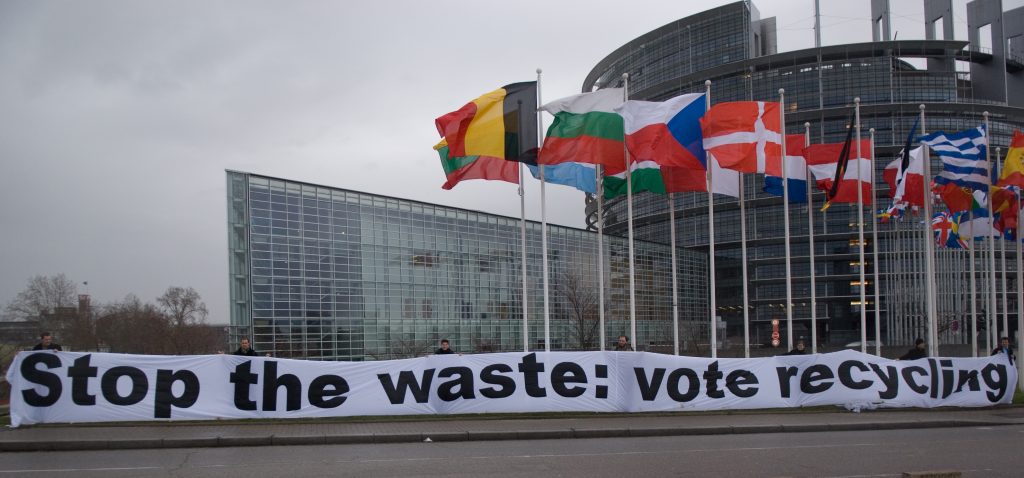Brussels, February 14 – A new study, released today [1], shows that the proposed binding minimum EU recycling targets of 50 per cent for municipal waste [2] by 2020, currently discussed by the European Parliament, could save emissions equivalent to more than 89 million tonnes (mt) of CO2 equivalent per year. This is equivalent to taking 31 million cars off the road. The study builds on a UK report [3] which found that most studies showed that recycling was better for the climate than incineration.
Dr Michael Warhurst of Friends of the Earth Europe said: “Recycling our waste helps to tackle climate change, and targets are the best way to make sure recycling really happens across Europe. This study shows the massive potential benefits from targets for municipal waste. Friends of the Earth believes it is crucial that targets for business waste are also agreed, as these will also have massive benefits, and we all need to do our bit.”
The study also calculates the climate benefits of waste prevention, and finds that if waste volumes were stabilised at 2006 levels, a total of 1.1 billion tonnes of CO2 equivalents would be saved by 2020.
Nathalie Cliquot of EEB said: “This study provides further evidence that we must make waste prevention a reality, as it has the potential to save significant quantities of climate-changing emissions, not to mention avoiding environmental damage in the use of natural resources. The European Parliament has already supported a target to stabilise waste production across the EU at 2008 levels by 2012 – they must not let EU Governments dodge this crucial issue.”
The new research is released exactly a year after the European Parliament voted in its first reading for the following binding EU targets for prevention and recycling:
– Stabilisation of total waste generation in each EU country at 2008 levels by 2012
– A minimum recycling rate of 50 per cent for municipal waste by 2020, with the option of a 5-year delay for those countries with very low recycling rates.
– A minimum recycling rate of 70 per cent for industrial, commercial, construction and demolition wastes by 2020.
EU Governments have ignored the European Parliament’s vote in their first reading Common position, and the second reading is now starting with recycling targets as one of the main issues of negotiation. Five EU countries have already achieved the 50 per cent recycling rate for municipal solid waste, with others having set similar targets, demonstrating that this target really is achievable.
***
NOTES TO EDITORS:
[1] “Climate Protection Potentials of EU Recycling Targets”, Knut Sander (Okopol Gmbh), commissioned by the European Environmental Bureau and Friends of the Earth Europe. http://www.eeb.org/publication/documents/RecyclingClimateChangePotentials.pdfThe method used in the study released today was developed by the UK Government-funded Waste and Resources Action Programme (WRAP), adding up the climate benefits of recycling different waste streams based on a detailed review of life cycle assessments. Key climate benefits of recycling (including composting) are avoiding extraction and processing of materials (such as aluminium) and avoiding landfill of wastes that break down into the global warming gas methane. The study also examined the impact of a 65 per cent recycling target – closer to the rate currently achieved by countries with the most effective recycling – and found that emissions of over 145 million tonnes of CO2 equivalent could be saved over today’s average recycling rate in Europe.
[2] Municipal waste is waste from households, as well as other similar waste. [3] “Environmental Benefits of Recycling: An International Review of Lifecycle Comparisons for Key Materials in the UK Recycling Sector.” www.wrap.org.uk/document.rm?id=2839





